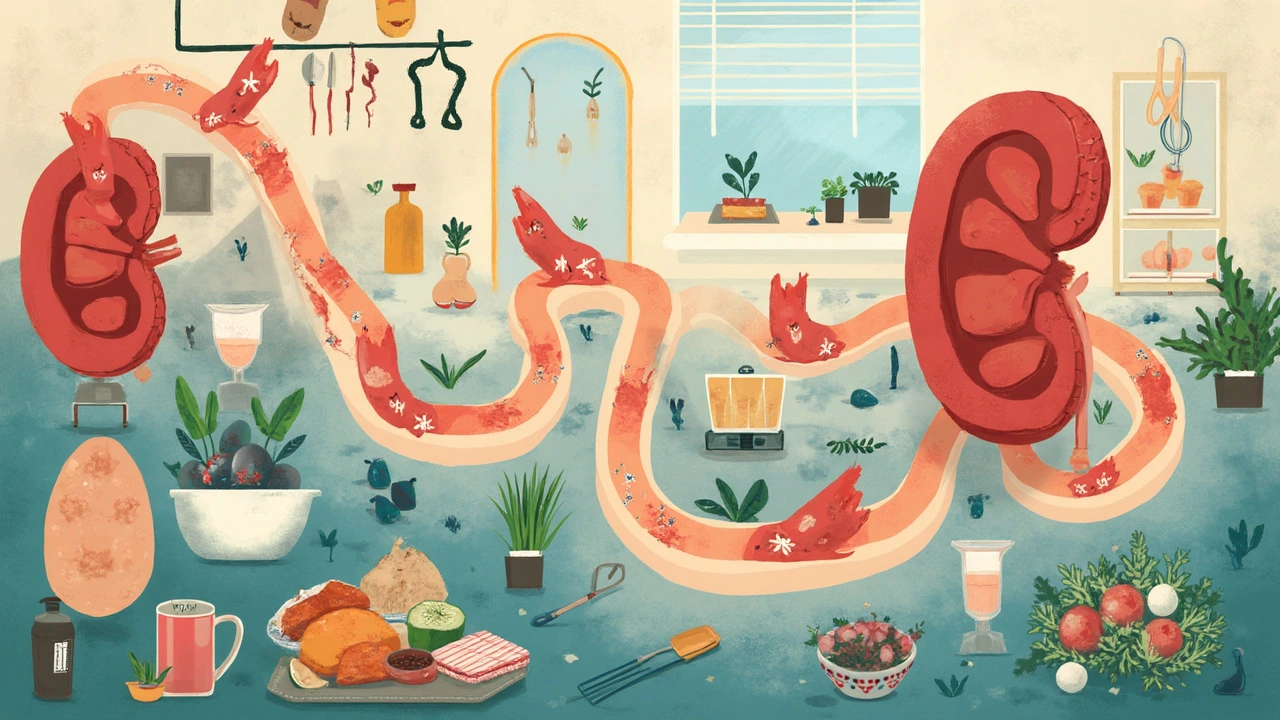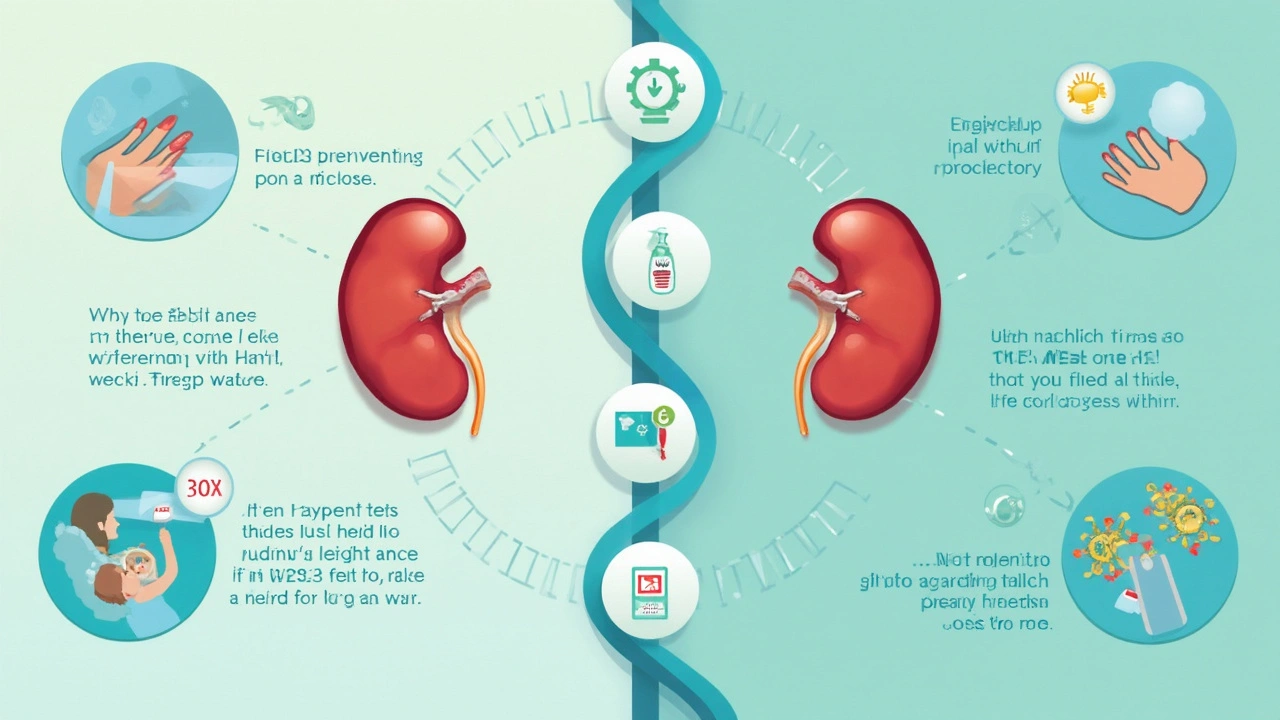Salmonella's Connection to Kidney Disease: What You Need to Know
 Mar, 10 2025
Mar, 10 2025
Imagine enjoying a delicious meal, only to find yourself feeling really unwell shortly afterward. That nasty culprit could be Salmonella, a tricky bacteria often hiding in foods we least suspect. While lots of folks just worry about the stomach issues it causes, there's more going on beneath the surface—particularly with our kidneys.
Yes, you heard it right! Salmonella's reputation goes beyond making us dash to the bathroom. In certain situations, it might even have long-lasting effects on kidney health. Sounds alarming, doesn't it? But fear not, because knowing more about this connection can play a big part in keeping our kidneys safe and sound.
First things first, it helps to know your enemy. Salmonella is more than just what it does to your stomach. It can be a real threat, especially if you're dealing with recurrent infections. This sneaky bacteria might trigger kidney inflammation or lead to more serious conditions over time.
So, how do we protect ourselves? It all boils down to good habits around food. Simple things like washing your hands, cooking food thoroughly, and being cautious with raw foods can make a world of difference. These practical steps aren't just about avoiding a day of discomfort; they're about long-term kidney health, which is something we all want to preserve.
- Understanding Salmonella
- How It Affects the Body
- Link to Kidney Disease
- Preventive Measures
- What to Do if Infected
Understanding Salmonella
Salmonella is one of those things you hear about when folks talk about food poisoning. But what exactly is it? Well, it's a group of bacteria that loves to hang out in the intestines of animals and humans. When it gets into our bodies through contaminated food or water, it can cause quite the ruckus.
The thing is, salmonella isn't always apparent right away. Symptoms usually pop up 6 hours to 6 days after consumption, and they include fever, diarrhea, and stomach cramps. That said, most healthy people recover without special treatment. But for some, especially those with weaker immune systems, it can be more serious.
What's more, salmonella is super common. In fact, the CDC estimates that it causes about 1.35 million infections in the U.S. every year! That's a whole lot of upset tummies.
The Science Behind It
Salmonella lives in the intestines and spreads through feces. It's mainly associated with undercooked eggs, poultry, and meat, but fruits and veggies aren't entirely safe either. Cross-contamination in the kitchen, like using the same cutting board for raw chicken and salad, can invite trouble.
"Salmonella remains a leading cause of bacterial foodborne illness worldwide," says Dr. Alicia Cole, an infectious disease expert. "Vigilance in food handling and hygiene is crucial to reducing disease risk."
Types of Salmonella
Not all salmonella bacteria are created equal. There are over 2,500 different types, but only a few are responsible for making us sick. Luckily, knowing how it works and spreads helps in keeping us safe.
Here's a quick look at the two main types:
- Salmonella Typhi: Known for causing typhoid fever, it’s more common in parts of the world without clean water systems.
- Nontyphoidal Salmonella: This type is what usually causes the stomach problems we often hear about. It's more common and widespread.
The more you know about salmonella, the better you can protect yourself and your family from its unpleasant effects. So, keep those hands washed and the cooking surfaces clean!
How It Affects the Body
Salmonella is like a stealthy invader once it gets into your system. It usually enters the body through contaminated food or water, and from there, it starts causing trouble. Most of us know the obvious symptoms – think nausea, vomiting, cramps. But there's more to the story.
When Salmonella gets cozy in your intestines, it can sometimes break out and enter the bloodstream. This is where things can get serious. If it spreads, it may lead to complications in other parts of the body, and this includes our kidneys. Surprising, right? In some cases, it can cause inflammation or even damage to these vital organs.
Salmonella and the Kidneys
Particularly for folks with weakened immune systems, the risk of kidney involvement is higher. The bacteria can trigger a reaction that might result in chronic issues like kidney disease if not tackled promptly. It’s one of those connections that isn’t obvious at first but is crucial to understand.
While not common, persistent infections can increase the risk of scars forming on the kidneys. This can reduce their efficiency and, over time, might even lead to chronic kidney disease. Quite the unwelcome souvenir from a seemingly simple infection!
So it's not just about dealing with a bout of stomach troubles—the impact of salmonella can linger long after the initial symptoms have gone. Being aware allows for prompt medical advice and care, which is essential in preventing those longer-term effects.
Key Stats to Know
| Impact | Percentage |
|---|---|
| People experiencing severe complications | 3% |
| Untreated cases leading to kidney issues | 1-5% |
It's clear that understanding the full impact of salmonella is more than just knowing how to treat a tummy ache. Paying attention to how it affects the whole body, especially for those with existing health concerns, can make a big difference in the outcome.

Link to Kidney Disease
So, what’s the deal with salmonella and kidney disease? Well, it turns out that salmonella isn’t just about upsetting your stomach. Some studies have pointed to a connection between recurring salmonella infections and a higher risk of developing kidney problems. Interesting, right?
When salmonella gets into your system, it's not just hanging out in one spot. It can cause inflammation and even make its way into your bloodstream. This means it can potentially affect your organs—yep, including your kidneys. And if you've been unlucky enough to deal with more than one bout of salmonella, the risk might be a tad higher.
Understanding the Risks
The potential threat lies in what's called 'bacteremia'—a condition where bacteria enter the bloodstream. If it lasts too long, it can cause inflammation in the kidneys or even trigger autoimmune responses where the body starts attacking its tissues by mistake. If you've got pre-existing kidney issues, this is something to seriously think about.
The Science Bit
You might find it surprising, but maintaining kidney health when having past salmonella infections might reduce risks. Here's a quick rundown of some links:
- Inflammation: Repeated infections lead to chronic inflammation that can weaken kidney function over time.
- Autoimmune Impacts: Long-term salmonella cases might create an immune response targeting kidney tissues.
It's definitely worth considering the role of our immune system in all this. Some research we're seeing looks at how salmonella might trigger unusual immune responses that could be a big factor in kidney disease.
Then What?
Prevention might be the best medicine here. Ensuring food safety, maintaining a balanced diet, and staying vigilant about personal hygiene could help keep salmonella and kidney issues at bay. And if you've ever had salmonella, maybe check in with your doctor about your kidney health, just to be safe.
Preventive Measures
Protecting yourself from salmonella infections involves smart handling and storage of food. Whether you're a culinary novice or a kitchen pro, keeping these simple yet crucial tips in mind can help you sidestep nasty surprises.
Smart Food Handling
To reduce the risk of salmonella, always start with clean hands. Wash your hands with soap and water before, during, and after handling food. This isn't just a mantra; it's a key step in stopping bacteria from spreading.
Cook Thoroughly
Believe it or not, the way you cook matters a lot. Make sure meats, especially poultry, eggs, and seafood, reach the right internal temperatures to kill bacteria. Use a food thermometer to ensure everything's cooked properly rather than just eyeballing.
Safe Food Storage
Don’t let food sit out too long. Bacteria like salmonella love room temperature. Refrigerating foods promptly can make a big difference. Should you find leftovers, tuck them away in the fridge within two hours of cooking.
Avoid Cross-Contamination
Here's a big one: keep raw meat and eggs separate from other foods. Use different cutting boards and utensils for raw and cooked foods to stay safe. Remember, even if surfaces look clean, bacteria might be lurking around.
Watch Out for Water Sources
Salmonella isn’t just in food. Contaminated water can also be a source. Be mindful when using lakes or streams, especially if you're camping or hiking. Always opt for treated water for drinks and cooking.
Protecting yourself from kidney disease linked to these infections boils down to awareness and a dash of diligence. By incorporating these steps into your routine, you’re not just preventing an acute illness; you're playing the long game for your health, especially kidney health.

What to Do if Infected
So, the worst has happened, and you've got a salmonella infection. Now what? First thing, don't panic. It happens to the best of us, and there are steps you can take to bounce back.
Recognizing the Symptoms
Before you can beat it, you need to know you're dealing with it. Symptoms often include fever, stomach cramps, and diarrhea that usually starts six hours to six days after infection. If you've got these, it might be time to call in the experts.
When to See a Doctor
Most people recover without the need to see a doctor. However, if your symptoms are severe or persist longer than a few days, it's smart to get medical advice. As Dr. Emily Carter from the New Zealand Health Services says,
"If you experience an elevated fever or your symptoms aren't letting up, better to err on the side of caution and get checked out."
Home Remedies and Care
Stay hydrated! Diarrhea can dehydrate you quickly, so drink plenty of water or electrolyte solutions. Also, give your stomach a break with a bland diet until you're feeling better—think rice, bananas, toast. Avoid dairy and spicy foods, as they might make things worse.
Prevent Secondary Issues
If you suspect a salmonella infection, take extra care with bathroom hygiene to avoid spreading it to others. Wash your hands thoroughly and frequently, and disinfect shared surfaces.
Monitoring Your Recovery
Keep an eye on your symptoms as they improve. If you notice any signs of kidney issues, like changes in urination or back pain, reach out to your doctor as soon as possible. It's always better to catch things early.
Remember, while we can't avoid all the risks, being prepared and knowing what to do can make all the difference when facing a salmonella infection.

Elizabeth Grant
March 26, 2025 AT 14:38Y’all ever notice how salmonella just sneaks in like that one ex who shows up at your birthday party uninvited? I had it after a BBQ last summer - thought it was just bad tacos, but my kidneys have been acting weird ever since. Now I wash my hands like I’m performing a sacred ritual. No more raw egg pancakes for me. Ever. Seriously, folks - treat your gut like it’s the last Starbucks in a zombie apocalypse.
angie leblanc
March 27, 2025 AT 20:12wait… so u mean to tell me that salmonella is NOT just from bad chicken?? i think the gov is hiding something… i read on a forum that 5G towers make the bacteria stronger and they use it to test kidney chips in ppl… my cousin got sick after eating a burrito and now she has a ‘mystery illness’… also, why do they call it salmonella? is it from fish? i’m suspicious.
LaMaya Edmonds
March 28, 2025 AT 07:45Let’s be real - if you’re not sterilizing your cutting board like it’s a surgical suite, you’re just playing Russian roulette with your nephrons. Salmonella doesn’t care if you ‘like your steak rare’ - your kidneys do. Chronic inflammation? Autoimmune cross-reactivity? That’s not a footnote, that’s a red flag waving in a hurricane. And no, ‘I’ve had it before and I’m fine’ is not a valid medical thesis. You’re not a lab rat, you’re a human with two fragile, irreplaceable organs. Clean. Your. Space.
See Lo
March 29, 2025 AT 03:34Statistically, the 1-5% kidney complication rate is negligible - but the real issue is systemic overdiagnosis. The CDC's data is skewed by asymptomatic carriers who test positive post-hoc. Also, correlation ≠ causation. You can't blame salmonella for kidney disease without controlling for NSAID use, hypertension, and glyphosate exposure. And yes, I've reviewed the peer-reviewed meta-analyses. 🤓
Chris Long
March 30, 2025 AT 09:26They’re trying to make us afraid of food. Real Americans eat raw eggs, rare steak, and unwashed produce. This ‘kidney disease’ nonsense is just another way for Big Pharma to sell you drugs. If your kidneys can’t handle a little salmonella, maybe you’re just weak. Back in my day, we didn’t have hand sanitizer - we had grit. And guess what? We lived longer.
Liv Loverso
March 31, 2025 AT 02:57Salmonella isn’t just a pathogen - it’s a mirror. It reflects how disconnected we are from the source of our food, from the rhythm of our bodies, from the humility of being mortal creatures in a world that thinks it can engineer immunity. We treat our guts like trash bins and then wonder why our kidneys start screaming. The real infection isn’t bacterial - it’s spiritual. We’ve forgotten that eating is sacred, not transactional. So yes - wash your hands. But also, ask yourself: why did we ever stop respecting the life we consume?